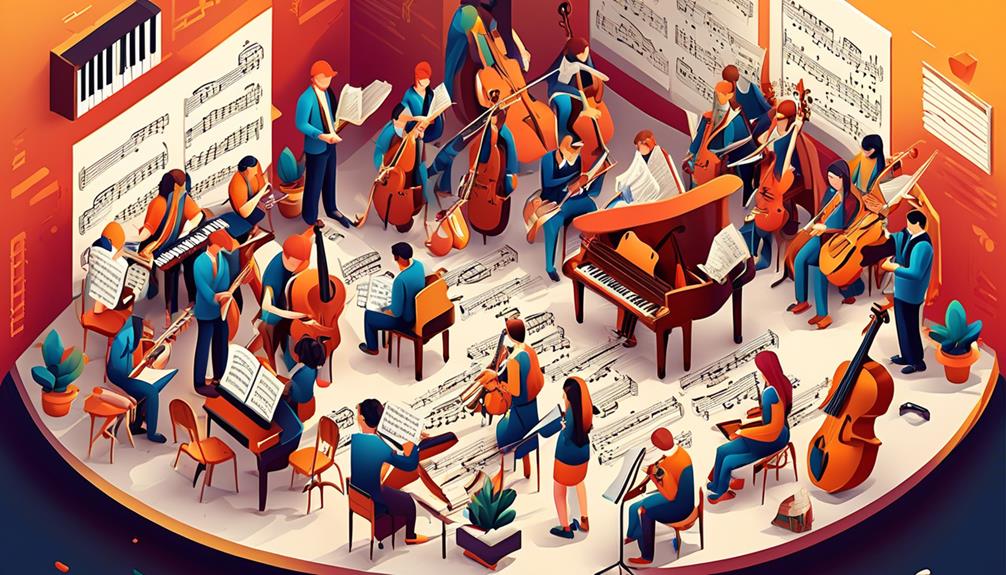I have come across an interesting statistic that highlights the positive impact of music education on academic performance.
Did you know that students in schools with music programs have higher graduation and attendance rates compared to schools without music education?
This statistic alone sheds light on the significant benefits of music education, but there's much more to uncover about the impact of music on students' overall development and success.
Key Takeaways
- Music education enhances fine motor skills.
- Music education boosts academic performance in subjects like math, reading, and science.
- Lack of adequate funding results in limited access to musical instruments and instructional materials.
- Over 3.6 million students don't have access to music education at all.
Importance of Music Education
In my experience, the importance of music education can't be overstated. As a music educator, I've witnessed firsthand the transformative power of music in the lives of students. The statistics speak for themselves – schools with music programs report higher graduation rates and better attendance.
It's not just about creating the next generation of musicians; music instruction has a profound impact on cognitive abilities. It enhances fine motor skills, sharpens sound distinction, and even boosts academic performance in subjects like math, reading, and science. Moreover, music education fosters emotional stability and reduces discipline issues, creating a positive and supportive learning environment.
Beyond the immediate benefits, music education lays the groundwork for long-term advantages. It improves memory, language skills, and overall brain development. These are skills that extend far beyond the music classroom and into every aspect of a student's life.
The importance of music education reaches far beyond simply learning to play an instrument or sing; it shapes well-rounded, capable, and resilient individuals.
Current State of Music Programs

As a music educator, I've seen firsthand the challenges that music programs face today. Program funding is often insufficient, leading to limited resources and opportunities for students.
Additionally, there's a shortage of qualified music teachers, and many students lack access to instruments, hindering their ability to participate and excel in music education.
Program Funding Challenges
Funding challenges in music programs often lead to reduced resources and limited access to instruments and instructional materials, impacting the quality of music education in schools. As a result, students are deprived of the many benefits associated with music education.
The current state of music program funding presents several challenges:
- Budget cuts and limited resources can lead to reduced or eliminated music programs.
- Lack of adequate funding results in limited access to musical instruments and instructional materials.
- Qualified music educators may be in short supply due to funding constraints.
- Hurdles in providing diverse and comprehensive music education opportunities for students arise.
Advocacy and support for increased funding and resources are crucial to address these challenges.
Teacher Shortages
Experiencing a prevalent shortage of music teachers, the current state of music programs significantly impacts the quality and accessibility of music education for students.
The lack of music teachers affects the availability of comprehensive music programs in schools, potentially limiting students' exposure to music education. It also poses challenges in maintaining diverse and robust music curriculums, thus impacting the overall quality of music education.
Additionally, existing music educators may face increased workloads, potentially affecting the individualized attention and instruction students receive.
Addressing teacher shortages in music programs is crucial to ensure equitable access to high-quality music education for all students. By addressing these shortages, we can work towards providing students with the opportunity to develop their musical talents and appreciation, contributing to a well-rounded education.
Access to Instruments
The impact of teacher shortages on music programs has led to a critical examination of the current state of music education, particularly in terms of access to instruments. Despite 92% of students having access to music education during the school day, over 3.6 million students don't have access to music education at all.
Similarly, 96% of students have access to arts education during the school day, but over 2 million students don't have access to any arts education. Alarmingly, a disproportionate number of students without access are Black, Hispanic, or Native American.
This inequity in access to music and arts education highlights the need for greater investment and resources to ensure all students have the opportunity to engage with music and the arts.
Challenges in Music Education

Amidst the growing recognition of the benefits of music education, challenges persist in ensuring equitable access and resources for all students. Despite the proven positive impact of music education on academic performance, emotional well-being, and career opportunities, disparities in access to music and arts education still exist.
Students from underprivileged backgrounds often face barriers in accessing quality music education programs, limiting their opportunities for holistic development. Additionally, budget cuts and competing priorities in school curriculums pose significant challenges to the availability of music education for all students.
Furthermore, the shortage of qualified music educators and the lack of professional development opportunities can hinder the delivery of high-quality music education. These challenges highlight the need for a concerted effort to address the inequities in music education and ensure that all students have access to comprehensive music programs.
Benefits of Music Education

As we recognize the challenges in music education, it becomes evident that the benefits of music education are substantial and far-reaching. The impact of music education goes beyond the realm of music itself, extending into various aspects of a student's life.
Based on the facts, the benefits of music education include:
- Improved academic performance and test scores, leading to higher graduation and attendance rates in schools with music programs.
- Cognitive enhancements such as improved fine motor skills, sound distinction, and enhanced problem-solving and critical thinking abilities.
- Stress relief, reduced drug use, and promotion of emotional stability and intelligence in students.
- Long-term benefits such as improved memory, language skills, and overall brain development.
- Enhancement of social skills, reduction in discipline issues, and fostering of emotional stability and social interaction through connecting with others and accepting constructive criticism.
These benefits underscore the crucial role of music education in not only shaping students into well-rounded individuals but also in contributing to their academic and emotional development.
Impact on Academic Growth

Amplifying academic growth, music education has been linked to higher graduation rates and improved performance on reading and spelling tests among students. Research shows that students involved in music education tend to perform better academically, scoring higher on various academic assessments. Notably, music education has been associated with higher graduation rates and attendance compared to schools without music programs.
Moreover, music training has been found to enhance children's abstract reasoning skills more than computer instruction. This suggests that music education not only contributes to academic growth but also fosters cognitive development. Additionally, music education has been shown to improve cognitive skills such as problem-solving, critical thinking, and creativity, all of which are essential for academic success.
Beyond cognitive benefits, music education also provides emotional and psychological advantages, promoting emotional stability and reducing stress and anxiety levels in students. These findings highlight the significant impact of music education on academic growth, making a compelling case for the integration of music programs in educational curricula.
Music Education and Student Development

Building on the positive impact of music education on academic growth, the focus now shifts to the correlation between music education and student development. Music education has been found to have a profound influence on various aspects of students' personal and cognitive development.
The following points shed light on the importance of music education in fostering holistic student development:
- Higher graduation rates and attendance compared to schools without music programs
- Larger vocabularies, advanced reading skills, and improved memory among music students
- Reduced substance use and emotional stability among secondary students involved in music education
- Improved cognitive abilities and fine motor skills in students participating in music programs
- Enhanced academic performance in subjects such as math, reading, and science due to music education
These findings highlight the multifaceted benefits of music education beyond academic achievement. They underscore the valuable role of music in shaping students into well-rounded individuals with enhanced cognitive abilities, emotional resilience, and a greater likelihood of academic success.
Advocating for Music Education

Advocating for music education is essential in ensuring equitable access and opportunities for all students, regardless of their background or socioeconomic status. The benefits of music education on academic performance, cognitive abilities, and emotional well-being are well-documented. However, not all students have equal access to these benefits. Disparities in access to music and arts education disproportionately affect students from minority and low-income backgrounds.
Advocacy efforts play a crucial role in addressing these inequities by raising awareness and garnering support for music education in schools. Reports on the status of arts and music education have been instrumental in highlighting the importance of these programs and advocating for their inclusion in school curriculums.
Frequently Asked Questions
What Are the Specific Funding Sources for Music Programs in Schools?
I'll discuss the specific funding sources for music programs in schools. Federal grants, state funding, private donations, corporate sponsorships, and crowdfunding initiatives all contribute to supporting music education in schools.
How Do Music Education Statistics Differ Between Urban and Rural Areas?
In urban areas, music education statistics show higher graduation rates and lower substance use among students involved in music groups. Disparities in access are more pronounced for minority students. Advocacy for support is crucial.
Are There Regional Disparities in Access to Music Education Resources?
Yes, there are regional disparities in access to music education resources. For example, major urban or very rural areas and among Black, Hispanic, or Native American students face more pronounced disparities in access.
What Are the Long-Term Career Outcomes for Students Who Participate in Music Education Programs?
Participating in music education programs has long-term career benefits. It fosters creativity, discipline, and collaboration, all valuable in various professions. Additionally, it enhances problem-solving skills and emotional intelligence, contributing to overall career success.
How Do Music Education Statistics Compare Between Public and Private Schools?
In public and private schools, music education positively impacts graduation rates, attendance, academic honors, and critical brain function development. Private schools generally show higher rates and achievements in these areas compared to public schools.
Conclusion
Well, who knew that learning to play the guitar could also make you a math whiz?
Music education isn't just about hitting the high notes, it's about hitting those high grades too.
It's like hitting two birds with one stone, but in a much more harmonious way.
So, next time you're thinking about cutting the music program, just remember that you might be cutting off your chances of success too.










